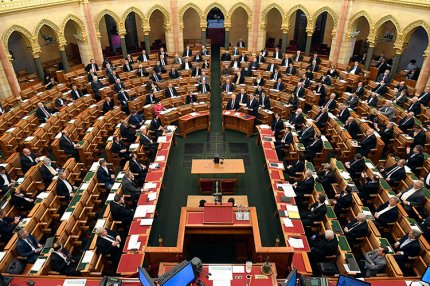Almost all democracies have had to make unpalatable choices during these Corona times: Nation states around the world have adopted special laws and introduced legal decrees, which are often very far from what one would normally accept in a democratic state. Nevertheless, it has been found necessary in order to combat the spread and the damaging effects of the Chinese COVID19.
Hungary is no exception and, with Viktor Orban at the forefront, the government has issued a special law that has contributed to the persistent criticism of Orban and the state of democracy in Hungary. Thus, the Director of the Think Tank Europe, Lykke Friis, in Berlingske on March 23 stated that Orban's Corona law "... is a de facto repeal of democracy and freedom of speech" and points out that the bill means that the parliament will close, that no elections will be held, and that the government will rule by decree.
The most frequently criticized points of Hungary's Corona law are:
- That it doesn't, like the Danish “laws”, contain a sunset clause,
- That it actually gives Prime Minister Viktor Orban the power to govern the country by decree,
- That it suspends the holding of elections,
- That it introduces a new penal provision that can provide up to 5 years in prison for providing false information about an emergency that can cause alarm in a large group of people.
Although the Free Press Society does not deal with Corona law where it does not relate to freedom of speech, Lykke Friis' assertion that Hungary's Corona law is a de facto repeal of both democracy and freedom of speech compels us to look closer at the main elements of Orban's new law.
It is true that the Hungarian Corona law does not, like the Danish law, contain a sunset clause. From an immediate point of view, this could mean that Orban, in effect, has carte blanche to extend the effect of the Corona law infinitely to his own (dictatorial) advantage. However, if you look at the text of the law, it is unmistakable that the law relates exclusively to COVID 19, which is why it must necessarily lapse / come out of force when the epidemic has passed. And it must be noted, this can in principle take place well before the expiry of the sunset clause in Danish law, which has March 1, 2021 as the expiration date.
It is also true that Hungarian Corona law gives Orban the power to govern the country by decree at the time the law takes effect. It would be a completely unnecessary and disproportionate measure in a democracy that, as the case may be, could result in a slide towards more totalitarian conditions. At home, many, with increasing concern, watched Mette Frederiksen's growing autocracy the first weeks after our society had been shut down with the government having been given the most far-reaching powers given in peacetime. Powers given in the confidence that the Prime Minister, Mette Frederiksen, would share her decision-making basis with the parties and the population, but which was quickly reduced to information on new initiatives with reference to the so-called health professionals’ expertise.
Without any comparison, it illustrates how easy it is for a democratic government leader to forget basic parliamentary ground rules in a time of crisis. Orban's rule-by-decree is to be sure a worrying aspect of the Hungarian Corona law, but we can only determine the effect of this after the epidemic is over when we can see if to what extent Viktor Orban will make use of management per decree. Nevertheless, the mere possibility of managing a country ad hoc and per decree an obvious democratic problem.
On the other hand, it is very difficult to see the undemocratic or disproportionate in canceling election campaigns as long as the epidemic lasts. Furthermore, the claim that the cancellation applies to all elections is decidedly wrong: the law specifically states that referendums or local / supplementary elections cannot be held, but makes no mention of parliamentary elections. Probably because the Corona epidemic will be long finished when the Hungarians next have to elect a new parliament in 2022. That the cancellation of elections during the epidemic should be made a point of criticism seems almost grotesque when you consider that the Democrats conducting the primary election in Wisconsin on 7 April were strongly criticized for the obvious risk of exposing citizens to the risk of infection with Corona virus.
Finally, it is extremely difficult to see new punishments in Hungary's Corona law, (the one that can result in up to 5 years in prison for providing false information about the emergency that can alarm a large group of people) to be a disproportionate and unnecessary intervention in freedom of speech. In any case, the provision does not deviate to any appreciable extent from what the Danish Parliament has adopted in Danish law - and only a few have found it necessary to criticize the possibility of, for example, closing websites that provide false or incorrect facts about the COVID-19 epidemic in Denmark. It is simply hypocritical to attack Hungary on this basis (pot calling the kettle black).
One can hardly fail to notice that the criticism of Hungary is anything but politically tinted, because we, in Denmark, to a large extent, do the same thing as the Orban government does in Hungary: suspending the freedom of assembly, and the attack on the inviolability of the home.
That said, it is undeniable that Hungary, with its Corona law, has dispensed from a normal, democratic state of law. And, we must always keep a sharp and critical eye on new emergency laws, because they can so easily continue beyond the crisis to announce a new state of law.
Emergency laws are and always must be the exception that confirms the basic democratic rule. The Free Press Society considers it the company's ultimate obligation to keep a close watch on the Corona law in Hungary - just as we will be watching the Corona law in Denmark, so that they remain the exceptions that confirm the democratic rule.



